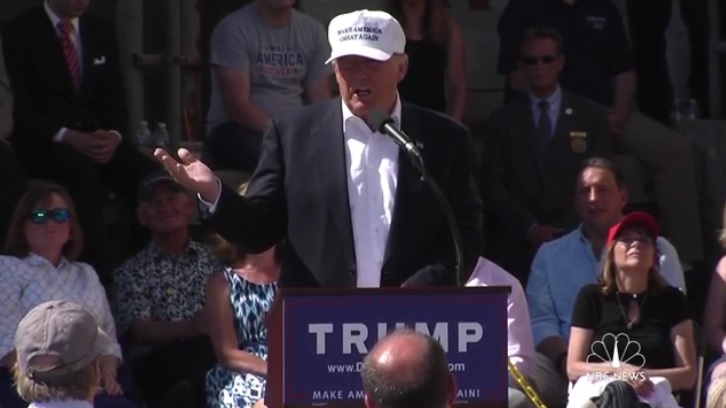Local News
Trump talks trade at shuttered N.H. factory, mocks Mexicans could be attacking

Presumptive GOP presidential nominee
appeared to have deviated from prepared speech
MANCHESTER, N.H. (AP) — Republican Donald Trump talked trade at a shuttered New Hampshire factory on Thursday, putting a more personal spin on his vow to rip up the nation’s trade deals and impose new tariffs in an effort to revive local manufacturing jobs.
Speaking to a small, invitation-only crowd outside the closed Osram Sylvania plant, which used to manufacture lighting products, Trump again called for backing away from decades of U.S. policy that encouraged trade with other nations.
The approach marks a departure from the free-trade tenants of conservative orthodoxy, and has been panned by Democrats as well as the usually Republican-friendly U.S. Chamber of Commerce, which warned it would lead to millions of job losses and a recession.
Trump also had this to say:
Video: Trump sees a plane overhead, says “That could be a Mexican plane up there—they’re getting ready to attack.” https://t.co/ryWXqnrMgx
— Bradd Jaffy (@BraddJaffy) June 30, 2016
“I respect Mexico. I respect their leaders, what they’ve done to us is incredible. Their leaders are so much smarter, so much sharper. And it’s incredible,” he said, then gestured upward as an aircraft passed. “In fact that could be a Mexican plane up there. They’re getting ready to attack.”
Trump used the factory, which closed in 2014 and moved some of the 139 jobs moved to a plant in Mexico, as an example of the human toll of trade deals like NAFTA. And he put the blame solely on his Democratic rival Hillary Clinton and her husband, former Bill Clinton, who signed the deal.
“This legacy is largely due – and you could actually say entirely due – to NAFTA,” he said, adding: “The real Clinton Global Initiative is their economic plan to ship America’s jobs overseas.”
However, a spokesman for Osram said Thursday the company did not shift jobs to Mexico due to any free trade agreements, including NAFTA. Instead, spokesman Glen Gracia said, the shift was a response to declining demand for traditional lighting products that were produced at the Manchester, New Hampshire facility. Gracia said the company transferred production for those products to Juarez, Mexico, and Foshan, China.
Osram still has two plants open in New Hampshire, employing about 850 people, Gracia said.
The Energy Independence and Security Act, signed by President George W. Bush in 2007, is part of what led to the use of more energy-efficient lighting and caused the lower demand in products made at the Osram plant, Gracia said.
Trump argued that some incentives, such as interest-free loans, that have been used to keep companies in the country are ineffective. Instead, he’s proposing a 35 percent tariff on goods like car parts and air conditioners produced by companies that ship jobs overseas.
“We’re either going to keep ’em here or we’re going to make a hell of a lot of money. It’s very simple,” he said. “And they’re going to regret that they ever moved.”
Trump made the case that, while his policies would most likely lead to price increases, more and higher-paying jobs would compensate.
“When you forced workers in America to compete with workers earning $1 a day overseas, our whole standard of living goes down,” he said.
“We’re better off paying a little bit more and having jobs,” he added. “It’s a much better system. The way it used to be.”
But polling shows that the vast majority of Americans say they prefer lower prices instead of paying a premium for items labeled “Made in the USA.” A recent Associated Press-GfK poll found that, when asked to choose between $50 pants made in another country or an $85 pair made in the United States, 67 percent of respondents chose the cheaper pair. Only 30 percent would pony up for the more expensive American-made goods.
Asked during the question-and-answer session whether he would push for a cultural change to that calculus, Trump embraced the idea.
“Our people should have more pride in buying made in the USA,” he said.
Democratic groups were quick to point out that Trump’s own clothing line, including shirts, ties and cologne, is manufactured in countries like Mexico, China, and Bangladesh. Trump has said in the past that current conditions make it “almost impossible for American companies to compete.”
Critics have taken issue with Trump’s portrayal of trade as the ultimate boogeyman. While it’s true that manufacturing is in rapid decline – with 4.5 million manufacturing jobs lost since NAFTA took effect in 1994 – it’s not easy to assign blame. In a report last year, the Congressional Research Service concluded that NAFTA’s effect on the nation’s economy “appears to have been relatively small.” Technology is likely the bigger culprit for job losses; robots and other machines make it possible to produce more with fewer workers.
Levying tariffs would probably require congressional approval and could set off a trade war.
Trump was also asked questions on other topics. One came from a man who said he was opposed to “wasting” military efforts in the Middle East on behalf of “Zionist Israel.”
Trump, who has sometimes been slow to shut down provocative questions, was quick to call Israel as a “very important ally” and vowed “to protect them 100 percent.”
He also received a question from a woman who argued that more veterans should be put in charge of border security and the TSA.
Why not “get rid of all the ‘heejabies’ they wear at TSA?” the woman, who gave her name as Cathie Chevalier, asked – apparently referring to hijabs worn by some Muslim women. “I’ve seen them myself.”
“I understand,” Trump told her. “And we are looking at that. We’re looking into a lot of things,” he said.

